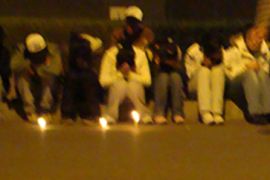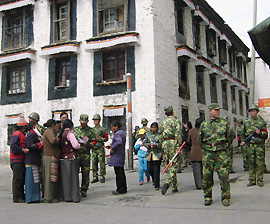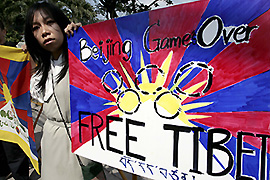Tibet student protester speaks out
Beijing-based Tibetan student tells of hopes and fears in wake of crackdown.

 |
| Images of a protest vigil by Tibetan students in Beijing have been posted on the internet |
Around 100 Tibetan students in Beijing have taken part in a candlelit vigil in a rare public display of protest in the Chinese capital.
The students from Beijing’s Central University for Nationalities, prayed for three hours on Monday evening for Tibetans they say were killed in a Chinese crackdown.
|
They told us it would be bad for us if we did this again |
Chinese authorities have taken a firm line on student activism since the 1989 Tiananmen Square demonstrations and heavy-handed police and security prevented foreign journalists from witnessing the vigil.
Nonetheless video footage of the event has leaked out of a China and a few blurred images have been posted on the internet by supporters.
Al Jazeera spoke to one of the protesters, 23-year old Dolme, an ethnic Tibetan from Sichuan province.
Her name has been changed to protect her identity
“We wanted to express our sympathy with our people in Tibet and pray for all our people who have been killed,” says Dolme, adding that she and many others in the sit-down had wept while they prayed.
“We feel so very sad because we are so helpless. They have killed monks and common people – you must know this.”
 |
| Chinese security forces have imposed a lockdown on Tibet [Reuters] |
We are in a small café speaking in hushed tones. As she talks her friends throw nervous glances behind us at other customers, worried they will overhear.
She says she doesn’t know how many have died but from communications she is receiving she thinks it is a lot more than the official count of 13 and even more than the 100 claimed by exiled Tibetan groups.
With Tibet and much of the surrounding area under security lockdown, it has become almost impossible for journalists to verify the conflicting claims.
Dolme says she and her classmates at the university have been talking by phone to friends and relatives in Tibetan areas who have passed on reports of Chinese police gunning down ethnic Tibetans in the streets.
People have also told her of security forces holding monks under house arrest in their monasteries, cutting off their electricity and water supply.
| Your Views |
|
Could the Tibetan protests derail China’s plans for a smooth run-up to the Beijing Olympics? |
A friend of her family, a man her father’s age who was on pilgrimage to Lhasa, is the only person she knows personally who has died, Dolme says, but she is not sure how he was killed.
“It is difficult to know exactly what is happening when we are here in Beijing,” she says.
China has locked down the country’s Tibetan areas, going as far as blockading ethnic districts of Sichuan‘s capital Chengdu after riots which followed days of peaceful protests by monks in Lhasa.
Exile groups are calling it a spontaneous eruption of anger and resentment at decades of oppressive Chinese rule, while Beijing is accusing the Dalai Lama of instigating the violence – allegations the exiled spiritual leader denies.
| In depth | |
|
“This violence is definitely not his wish,” says Dolme, adding “you must know who I mean by ‘he’.”
Many Tibetans in Beijing are too scared to use the Dalai Lama’s name in public, referring to him only by the pronoun.
“Tibet is so sensitive and whenever anything happens the Chinese always blame him, but it’s not necessarily true. If he was really behind this he would never have got the Nobel peace prize.”
She laughs when I ask her if she trusts the Chinese news reports. “In this kind of situation… do you think they could tell the truth?”
Dolme is from a fairly well-off family at a county seat in a Tibetan area of Sichuan province.
She doesn’t have any major grievances with life under the Chinese, the government paid all her expenses to come to university and study Tibetan culture in Beijing.
Given the choice she says she wants more autonomy for Tibet not a declaration of independence.
“Independence is not possible. Tibet is too poor and besides China will never give up Tibet,” she says.
“In my heart I know Tibet is not part of China, so it doesn’t matter what the Chinese say as I long I know the truth in my heart.”
 |
| China’s crackdown has triggered calls for a boycott of the Beijing Olympics [Reuters] |
In some measure, the size and scale of the uprising is rooted in how Beijing has demonized the Tibetans’ spiritual leader and interfered in their Buddhist beliefs.
“He’s sacred, he’s holy to us… so of course he is higher to us than the Chinese government. Who is the Chinese president anyway? To us Tibetans, he [Hu Jintao] is nothing,” she says.
Dolme and her fellow students held their vigil until about 11:30pm when their candles died out, but security surrounded them, stopping other students from taking pictures.
The next day they were subjected to hours of meetings warning them that there was no pointing in protesting again.
“They told us it would be bad for us if we did this again. They didn’t say it but what they meant was that they would stop us from graduating,” Dolme explains.
But she says she would do it again. “I am the kind of person who is not afraid,” she shrugs.
“We all wish we there right now… all Tibetans should be there to help, we feel so frustrated that we can’t do much here.
“I don’t really know what we would do if we were there but at least we’d know what was really happening and we could take part.”
I ask her if she thinks the riots will help the Tibetan cause.
“The only thing that will happen is that there will be less Tibetans,” she says dryly. “Things will gradually get more repressive in Tibet.
“Once the protests have been put down it’s very difficult for them start up again. It will very difficult to spread because there are many Chinese soldiers in Tibet. They can stop anything.”
She checks her mobile phone; she’s waiting for a call from home. “I just hope no one else gets killed.”
